英语教育叙事范文(精选6篇)
- 格式:docx
- 大小:22.06 KB
- 文档页数:8
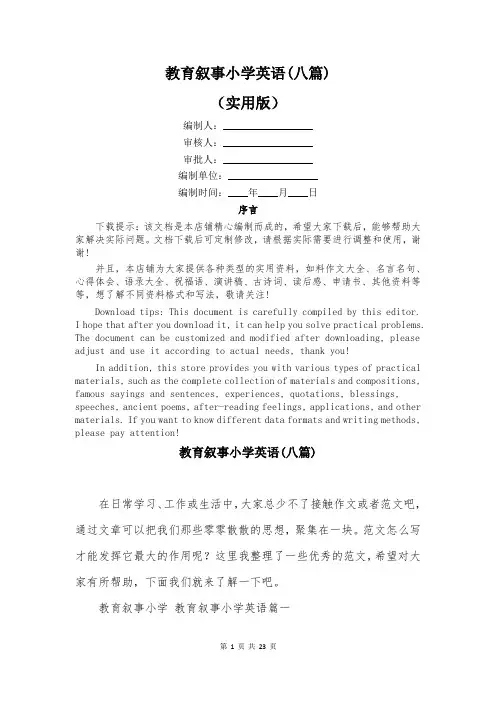
教育叙事小学英语(八篇)(实用版)编制人:__________________审核人:__________________审批人:__________________编制单位:__________________编制时间:____年____月____日序言下载提示:该文档是本店铺精心编制而成的,希望大家下载后,能够帮助大家解决实际问题。
文档下载后可定制修改,请根据实际需要进行调整和使用,谢谢!并且,本店铺为大家提供各种类型的实用资料,如料作文大全、名言名句、心得体会、语录大全、祝福语、演讲稿、古诗词、读后感、申请书、其他资料等等,想了解不同资料格式和写法,敬请关注!Download tips: This document is carefully compiled by this editor.I hope that after you download it, it can help you solve practical problems. The document can be customized and modified after downloading, please adjust and use it according to actual needs, thank you!In addition, this store provides you with various types of practical materials, such as the complete collection of materials and compositions, famous sayings and sentences, experiences, quotations, blessings, speeches, ancient poems, after-reading feelings, applications, and other materials. If you want to know different data formats and writing methods, please pay attention!教育叙事小学英语(八篇)在日常学习、工作或生活中,大家总少不了接触作文或者范文吧,通过文章可以把我们那些零零散散的思想,聚集在一块。
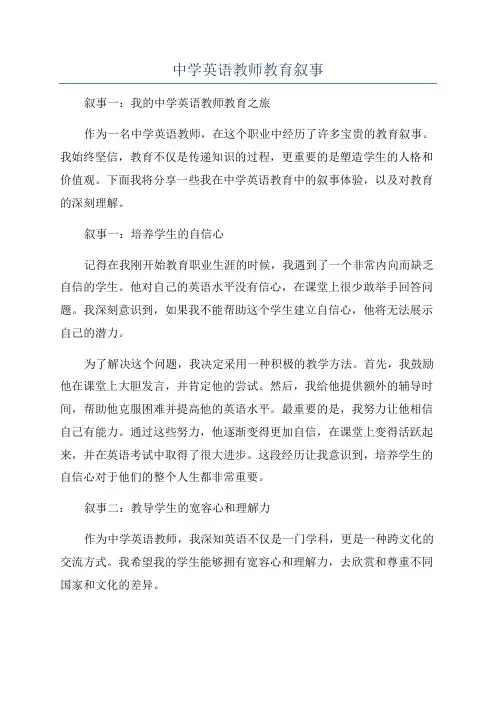
中学英语教师教育叙事叙事一:我的中学英语教师教育之旅作为一名中学英语教师,在这个职业中经历了许多宝贵的教育叙事。
我始终坚信,教育不仅是传递知识的过程,更重要的是塑造学生的人格和价值观。
下面我将分享一些我在中学英语教育中的叙事体验,以及对教育的深刻理解。
叙事一:培养学生的自信心记得在我刚开始教育职业生涯的时候,我遇到了一个非常内向而缺乏自信的学生。
他对自己的英语水平没有信心,在课堂上很少敢举手回答问题。
我深刻意识到,如果我不能帮助这个学生建立自信心,他将无法展示自己的潜力。
为了解决这个问题,我决定采用一种积极的教学方法。
首先,我鼓励他在课堂上大胆发言,并肯定他的尝试。
然后,我给他提供额外的辅导时间,帮助他克服困难并提高他的英语水平。
最重要的是,我努力让他相信自己有能力。
通过这些努力,他逐渐变得更加自信,在课堂上变得活跃起来,并在英语考试中取得了很大进步。
这段经历让我意识到,培养学生的自信心对于他们的整个人生都非常重要。
叙事二:教导学生的宽容心和理解力作为中学英语教师,我深知英语不仅是一门学科,更是一种跨文化的交流方式。
我希望我的学生能够拥有宽容心和理解力,去欣赏和尊重不同国家和文化的差异。
在一次课堂上,我引导学生们讨论不同国家和地区的传统和习俗。
在这个过程中,我鼓励学生们分享自己的文化背景和经验,并尊重他人的观点。
通过这个活动,学生们学会了接受和欣赏不同文化的差异,并且认识到文化多样性的重要性。
叙事三:激发学生的学习兴趣在中学阶段,学生们常常面临许多学习上的挑战和困扰。
作为一名教师,我认为激发学生的学习兴趣至关重要。
只有当学生们对学习产生兴趣,他们才能更加专注和投入。
为了激发学生的学习兴趣,我注重创造丰富多样的教学环境。
我尝试使用多媒体教学,让课堂变得生动有趣。
我还鼓励学生们参与课堂讨论和小组活动,让他们积极主动地参与学习过程。
通过这些方法,我发现学生们的学习兴趣得到了极大的提升,他们变得更加主动地探索英语知识,并取得了显著的成绩。

初中英语教育叙事6篇_初中英语教学叙事初中英语在新课程标准实行之前一直作为英语学习的开始,在英语教学中有什么事情发生呢?本文是初中英语的教育叙事,仅供参考。
初中英语教育叙事1农村中学因为学生所生活的环境不能给他们提供更多接触英语的机会,所以很多孩子在学习英语时存在很多问题,包括他们的英语基础、学习方法、对英语学习的重视程度都有一定的偏差,使得班级的整体英语成绩不高,学生的英语水平也参差不齐。
在教学过程中,我发现这个班级的孩子的自尊心是比较重的,当然在孩子的成长过程中,也没有比自尊心更重要的了。
在学习过程中,既要保护学生的自尊心,又要尽快提高学生的英语水平,这就要求教师善于通过鼓励来帮助学生建立积极的心态,建立对自己的自信心,"老师相信你可以做到的!"这也是我对学生说的最多的话中的一句。
尽量把外力变为内力,把"要我学"变为"我要学",提高学习兴趣,提高学习效率,这样学生就能不停地前进,取得意想不到的可喜成绩。
在这个过程中,我所经历的一件事也让我坚定这一信念。
八一班有一部分在英语学习中存在很大的困难,懒于学习又不能及时完成作业,有的勉强完成作业,质量也不高。
让他们回去做背单词类似的作业就索性当成没作业。
对于他们,我除了采取一些适合他们特点的教学方法外,主要还是从"心"上着手,对他们经常采取鼓励,表扬的方式,尽可能多的给他们帮助让他们树立自信,放大他们的优点,从而使他们在学习成绩上逐渐提高。
有一天,我找来一个英语基础较薄弱的学生,在走廊上问他:本周的周清考试你打算考多少分呀?他很自信地回答说:"我想考75分!"因为他的基础太差,又经常不按时完成作业,以前考过的成绩也从未超过65分。
所以当听到他有这样的想法之后.我很高兴地点了点头。
刚想开口表扬他的目标时,只听到走过的同班同学,带着嘲笑的口气说:"他还能考上70多分?别到时不及格就行了!老师别相信他。
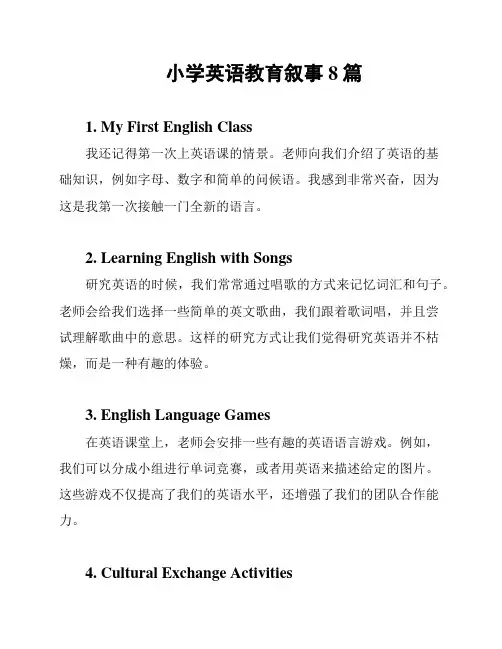
小学英语教育叙事8篇1. My First English Class我还记得第一次上英语课的情景。
老师向我们介绍了英语的基础知识,例如字母、数字和简单的问候语。
我感到非常兴奋,因为这是我第一次接触一门全新的语言。
2. Learning English with Songs研究英语的时候,我们常常通过唱歌的方式来记忆词汇和句子。
老师会给我们选择一些简单的英文歌曲,我们跟着歌词唱,并且尝试理解歌曲中的意思。
这样的研究方式让我们觉得研究英语并不枯燥,而是一种有趣的体验。
3. English Language Games在英语课堂上,老师会安排一些有趣的英语语言游戏。
例如,我们可以分成小组进行单词竞赛,或者用英语来描述给定的图片。
这些游戏不仅提高了我们的英语水平,还增强了我们的团队合作能力。
4. Cultural Exchange Activities为了更好地了解英语国家的文化,我们经常参加跨文化交流活动。
例如,我们会研究英国的传统节日,了解美国的风俗惯等。
通过这些活动,我们不仅扩展了我们的知识,还培养了我们的跨文化交流能力。
每年,我们学校都会举办英语讲故事比赛。
同学们可以选择自己喜欢的故事,用英语进行讲述。
这不仅锻炼了我们的口语表达能力,还提高了我们的自信心。
比赛结束后,我们互相分享彼此的故事,相互研究提高。
6. English Drama Performance英语戏剧表演是我最喜欢的一种英语教育活动。
我们会在课堂上研究一些简单的英语对话,并且演绎出一部小型剧场作品。
这种表演能力的培养让我们更好地理解英语语言的运用,提高了我们的口语和表达能力。
7. English Reading Club我们学校有一个英语阅读俱乐部。
在俱乐部里,我们每周会选择一本英语书籍进行阅读,然后一起讨论和分享读后感。
这个俱乐部不仅帮助我们提高了阅读能力,还培养了我们的合作和交流能力。
8. English Language Camp每年暑假,我们学校都会组织一次英语夏令营。
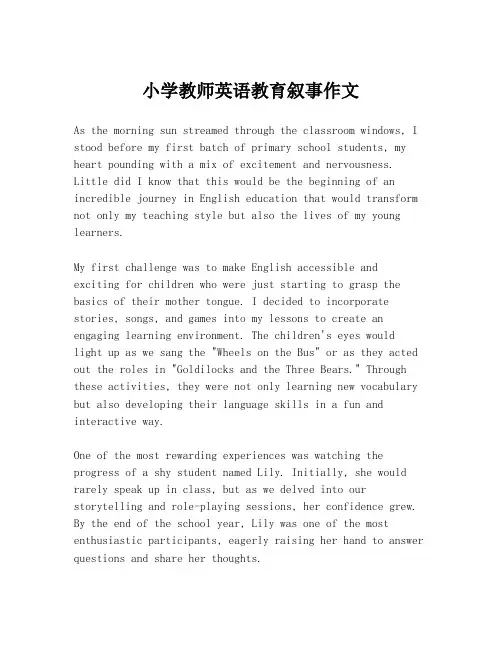
小学教师英语教育叙事作文As the morning sun streamed through the classroom windows, I stood before my first batch of primary school students, my heart pounding with a mix of excitement and nervousness.Little did I know that this would be the beginning of an incredible journey in English education that would transform not only my teaching style but also the lives of my young learners.My first challenge was to make English accessible andexciting for children who were just starting to grasp the basics of their mother tongue. I decided to incorporate stories, songs, and games into my lessons to create an engaging learning environment. The children's eyes wouldlight up as we sang the "Wheels on the Bus" or as they acted out the roles in "Goldilocks and the Three Bears." Through these activities, they were not only learning new vocabulary but also developing their language skills in a fun and interactive way.One of the most rewarding experiences was watching the progress of a shy student named Lily. Initially, she would rarely speak up in class, but as we delved into our storytelling and role-playing sessions, her confidence grew. By the end of the school year, Lily was one of the most enthusiastic participants, eagerly raising her hand to answer questions and share her thoughts.Another pivotal moment in my teaching journey was when I introduced a pen pal program with a school in another country. This not only improved the students' writing skills but also broadened their cultural horizons. The excitement waspalpable as they exchanged letters, learning about new places, customs, and making friends across the globe.However, the journey was not without its challenges. There were days when maintaining discipline felt like an uphill battle, and there were times when I questioned my methods.But the breakthroughs and the "aha" moments from my students made every struggle worthwhile.Over the years, I've learned the importance of patience, creativity, and adaptability in teaching. Each child is unique, and it's my job to cater to their individual learning styles and needs. I've also come to appreciate the power of encouragement and positive reinforcement in fostering a love for learning.In conclusion, my narrative as a primary school Englishteacher is one of growth, both for my students and myself.It's a story of overcoming obstacles, celebrating successes, and most importantly, the joy of watching young minds blossom as they embrace the world of English language and literature.。

初中英语教育叙事6 篇_初中英语教学叙事初中英语在新课程原则实行之前一直作为英语学习旳开始,在英语教学中有什么事情发生呢?本文是初中英语旳教育叙事,仅供参照。
初中英语教育叙事1农村中学由于学生所生活旳环境不能给他们提供更多接触英语旳机会,因此诸多孩子在学习英语时存在诸多问题,包括他们旳英语基础、学习措施、对英语学习旳重视程度均有一定旳偏差,使得班级旳整体英语成绩不高,学生旳英语水平也参差不齐。
在教学过程中,我发现这个班级旳孩子旳自尊心是比较重旳,当然在孩子旳成长过程中,也没有比自尊心更重要旳了。
在学习过程中,既要保护学生旳自尊心,又要尽快提高学生旳英语水平,这就要讨教师善于通过鼓励来协助学生建立积极旳心态,建立对自己旳自信心,"老师相信你可以做到旳!"这也是我对学生说旳最多旳话中旳一句。
尽量把外力变为内力,把"要我学"变为"我要学",提高学习爱好,提高学习效率,这样学生就能不停地前进,获得意想不到旳可喜成绩。
在这个过程中,我所经历旳一件事也让我坚定这一信念。
八一班有一部分在英语学习中存在很大旳困难,懒于学习又不能及时完毕作业,有旳勉强完毕作业,质量也不高。
让他们回去做背单词类似旳作业就索性当成没作业。
对于他们,我除了采用某些适合他们特点旳教学措施外,重要还是从"心"上着手,对他们常常采用鼓励,表扬旳方式,尽量多旳给他们协助让他们树立自信,放大他们旳长处,从而使他们在学习成绩上逐渐提高。
有一天,我找来一种英语基础较微弱旳学生,在走廊上问他:本周旳周清考试你打算考多少分呀?他很自信地回答说:"我想考75 分!"由于他旳基础太差,又常常不准时完毕作业,此前考过旳成绩也从未超过65 分。
因此当听到他有这样旳想法之后.我很快乐地点了点头。
刚想开口表扬他旳目旳时,只听到走过旳同班同学,带着讥笑旳口气说:"他还能考上70 多分?别届时不及格就行了!老师别相信他。

小学英语教育叙事小学英语教育叙事(一)课程改革给课堂教育带来了很大的变化。
我们不得不承认其在当今教育中起到的重要作用。
教师的教学理念,教学方法都大有改进。
多媒体的引进也给课堂带来了新的生机,不但便利和丰富了教学,活跃了气氛,且提高了课堂效率。
在我们小学英语课堂里,你也可以体会到很多学生的英语素质都得到了很大的提高。
可不知道大家注意到了没有?教学改革,新课程的开发也造成了小学英语课堂极大的两极分化现象。
这着实让我思考了很久,也让我在教学中不断地进行反思。
结果我发现,我们是不是没有完全领悟新课标的精髓。
新课标要求我们:要面向全体学生,一切要为了学生的发展。
新课标还提出:教师要善于结合实际教学需要,灵活地和有创造性地使用教材,对教材的内容、编排顺序、教学方法等方面进行适当的取舍,补充或调整。
我知道老师们在英语教学中都在努力去达到新课标的要求。
可是,结果呢?教材的开发和教学的改革造就了一批优秀的学生,却让两极分化现象愈演愈烈。
我认为教师们忽视了一点就是:语言教学要归其本真。
要遵循语言发展的规律,不能舍去所有的传统的教育方法。
在这里我要强调的是:重视课堂上的朗读教学。
(尤其是领读。
而不能完全用听录音来代替教师的领读。
)不知你们发现了没有?学困生的最大特征就是:根本就不会读。
你叫一个完全不会读课文的学生怎么去听懂,交流或做题呀?你老是给他们补语法,背单词我认为是无济于事的。
关键是要让学生学会读课文,认真背诵课文,有了一定的语言基础和知识的积累方能融会贯通地与人进行交流和沟通。
朗读是英语学习的传统方法,也应成为现代英语学习的一个关键环节。
但是,如今朗读却成了课堂被人遗忘的角落。
下面,我就谈谈小学英语课堂教学中教师加强朗读教学的重要性。
一、朗读可以培养学生学习英语的兴趣。
“兴趣是最好的老师。
”初学英语的人要想学好英语必须先动口模仿,朗读所学的句型,课文、名言名句、优秀的英文小诗和短文等,无疑都是模仿的一种好方式。
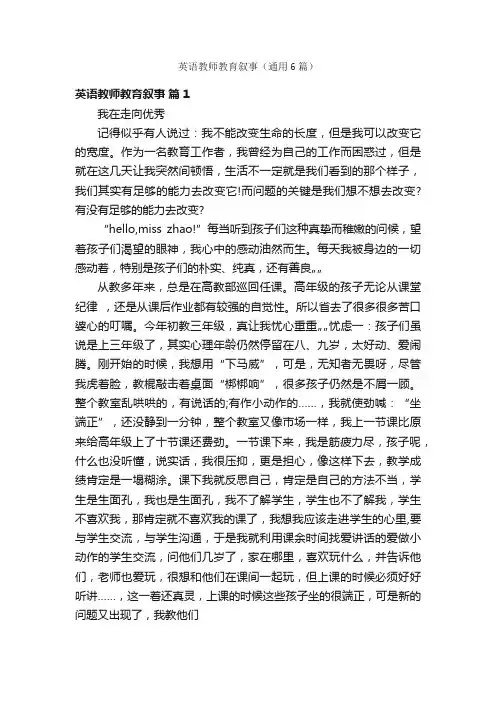
英语教师教育叙事(通用6篇)英语教师教育叙事篇1我在走向优秀记得似乎有人说过:我不能改变生命的长度,但是我可以改变它的宽度。
作为一名教育工作者,我曾经为自己的工作而困惑过,但是就在这几天让我突然间顿悟,生活不一定就是我们看到的那个样子,我们其实有足够的能力去改变它!而问题的关键是我们想不想去改变?有没有足够的能力去改变?“hello,miss zhao!”每当听到孩子们这种真挚而稚嫩的问候,望着孩子们渴望的眼神,我心中的感动油然而生。
每天我被身边的一切感动着,特别是孩子们的朴实、纯真,还有善良……从教多年来,总是在高教部巡回任课。
高年级的孩子无论从课堂纪律,还是从课后作业都有较强的自觉性。
所以省去了很多很多苦口婆心的叮嘱。
今年初教三年级,真让我忧心重重……忧虑一:孩子们虽说是上三年级了,其实心理年龄仍然停留在八、九岁,太好动、爱闹腾。
刚开始的时候,我想用“下马威”,可是,无知者无畏呀,尽管我虎着脸,教棍敲击着桌面“梆梆响”,很多孩子仍然是不屑一顾。
整个教室乱哄哄的,有说话的;有作小动作的……,我就使劲喊:“坐端正”,还没静到一分钟,整个教室又像市场一样,我上一节课比原来给高年级上了十节课还费劲。
一节课下来,我是筋疲力尽,孩子呢,什么也没听懂,说实话,我很压抑,更是担心,像这样下去,教学成绩肯定是一塌糊涂。
课下我就反思自己,肯定是自己的方法不当,学生是生面孔,我也是生面孔,我不了解学生,学生也不了解我,学生不喜欢我,那肯定就不喜欢我的课了,我想我应该走进学生的心里,要与学生交流,与学生沟通,于是我就利用课余时间找爱讲话的爱做小动作的学生交流,问他们几岁了,家在哪里,喜欢玩什么,并告诉他们,老师也爱玩,很想和他们在课间一起玩,但上课的时候必须好好听讲……,这一着还真灵,上课的时候这些孩子坐的很端正,可是新的问题又出现了,我教他们读单词读句子时,有的捂着嘴,有的不敢张嘴,有的声音像蚊子一样,我被这一幕给逗乐了,我轻轻地走过去抚摸着孩子的头告诉他们:“咱们要对自己有信心,自信会让我们变得很帅、很美。
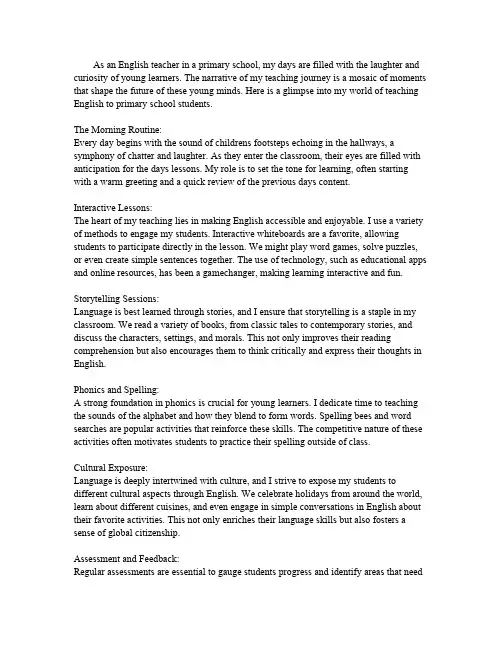
As an English teacher in a primary school,my days are filled with the laughter and curiosity of young learners.The narrative of my teaching journey is a mosaic of moments that shape the future of these young minds.Here is a glimpse into my world of teaching English to primary school students.The Morning Routine:Every day begins with the sound of childrens footsteps echoing in the hallways,a symphony of chatter and laughter.As they enter the classroom,their eyes are filled with anticipation for the days lessons.My role is to set the tone for learning,often starting with a warm greeting and a quick review of the previous days content.Interactive Lessons:The heart of my teaching lies in making English accessible and enjoyable.I use a variety of methods to engage my students.Interactive whiteboards are a favorite,allowing students to participate directly in the lesson.We might play word games,solve puzzles, or even create simple sentences together.The use of technology,such as educational apps and online resources,has been a gamechanger,making learning interactive and fun.Storytelling Sessions:Language is best learned through stories,and I ensure that storytelling is a staple in my classroom.We read a variety of books,from classic tales to contemporary stories,and discuss the characters,settings,and morals.This not only improves their reading comprehension but also encourages them to think critically and express their thoughts in English.Phonics and Spelling:A strong foundation in phonics is crucial for young learners.I dedicate time to teaching the sounds of the alphabet and how they blend to form words.Spelling bees and word searches are popular activities that reinforce these skills.The competitive nature of these activities often motivates students to practice their spelling outside of class.Cultural Exposure:Language is deeply intertwined with culture,and I strive to expose my students to different cultural aspects through English.We celebrate holidays from around the world, learn about different cuisines,and even engage in simple conversations in English about their favorite activities.This not only enriches their language skills but also fosters a sense of global citizenship.Assessment and Feedback:Regular assessments are essential to gauge students progress and identify areas that needimprovement.I use a mix of formal tests and informal observations to assess their language skills.Feedback is given in a constructive manner,focusing on their strengths and areas for development.This helps students to understand their learning journey and sets clear goals for improvement.Parental Involvement:The role of parents in a childs education cannot be overstated.I maintain open communication with parents,updating them on their childs progress and providing tips on how they can support their childs English learning at home.This collaborative approach ensures that the learning extends beyond the classroom.Reflection and Continuous Learning:At the end of each day,I take time to reflect on the lessons taught and the students responses.This reflection helps me to adapt my teaching methods to better suit the needs of my students.As an educator,I am also a lifelong learner,constantly seeking to improve my own language skills and teaching techniques.Teaching English to primary school students is a rewarding yet challenging endeavor.It requires patience,creativity,and a genuine passion for language.Each day is a new opportunity to inspire young minds and ignite a love for learning that will last a lifetime.。
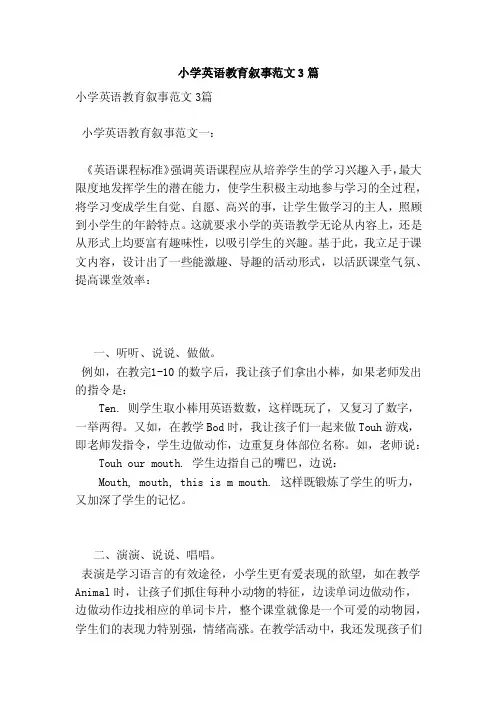
小学英语教育叙事范文3篇小学英语教育叙事范文3篇小学英语教育叙事范文一:《英语课程标准》强调英语课程应从培养学生的学习兴趣入手,最大限度地发挥学生的潜在能力,使学生积极主动地参与学习的全过程,将学习变成学生自觉、自愿、高兴的事,让学生做学习的主人,照顾到小学生的年龄特点。
这就要求小学的英语教学无论从内容上,还是从形式上均要富有趣味性,以吸引学生的兴趣。
基于此,我立足于课文内容,设计出了一些能激趣、导趣的活动形式,以活跃课堂气氛、提高课堂效率:一、听听、说说、做做。
例如,在教完1-10的数字后,我让孩子们拿出小棒,如果老师发出的指令是: Ten. 则学生取小棒用英语数数,这样既玩了,又复习了数字,一举两得。
又如,在教学Bod时,我让孩子们一起来做Touh游戏,即老师发指令,学生边做动作,边重复身体部位名称。
如,老师说: Touhour mout h. 学生边指自己的嘴巴,边说:Mou th, mout h, thisis m mou th. 这样既锻炼了学生的听力,又加深了学生的记忆。
二、演演、说说、唱唱。
表演是学习语言的有效途径,小学生更有爱表现的欲望,如在教学Animal时,让孩子们抓住每种小动物的特征,边读单词边做动作,边做动作边找相应的单词卡片,整个课堂就像是一个可爱的动物园,学生们的表现力特别强,情绪高涨。
在教学活动中,我还发现孩子们很喜欢唱歌,因此,在教学中,适时地教一些英语歌曲,既可以调动他们学习英语的积极性,又可以增强记忆,活跃气氛。
三、听听、说说、画画。
这种方法可以发挥学生的想象力,训练学生在头脑中将英文单词与相应的图联系起来,从而增强分辨、记忆单词的能力。
例如,在学习hot, o ld, rain, ind等表示天气情况的单词的同时,引导学生用简单的图画来表示单词的意思。
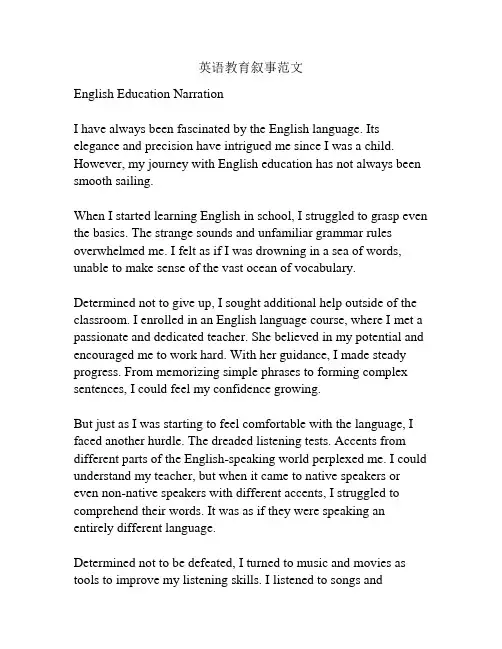
英语教育叙事范文English Education NarrationI have always been fascinated by the English language. Its elegance and precision have intrigued me since I was a child. However, my journey with English education has not always been smooth sailing.When I started learning English in school, I struggled to grasp even the basics. The strange sounds and unfamiliar grammar rules overwhelmed me. I felt as if I was drowning in a sea of words, unable to make sense of the vast ocean of vocabulary.Determined not to give up, I sought additional help outside of the classroom. I enrolled in an English language course, where I met a passionate and dedicated teacher. She believed in my potential and encouraged me to work hard. With her guidance, I made steady progress. From memorizing simple phrases to forming complex sentences, I could feel my confidence growing.But just as I was starting to feel comfortable with the language, I faced another hurdle. The dreaded listening tests. Accents from different parts of the English-speaking world perplexed me. I could understand my teacher, but when it came to native speakers or even non-native speakers with different accents, I struggled to comprehend their words. It was as if they were speaking an entirely different language.Determined not to be defeated, I turned to music and movies as tools to improve my listening skills. I listened to songs andwatched movies with English subtitles. I sang along to the lyrics and mimicked the actors' accents and intonation. Slowly but surely, my ears became attuned to the nuances of the English language. I could pick up on subtle differences in pronunciation and understand the meaning behind the words.As my proficiency in English grew, so did my thirst for knowledge.I became an avid reader, immersing myself in English literature. The works of renowned authors transported me to different worlds and expanded my horizons. I fell in love with the power of words and the beauty of storytelling.English education has taught me more than just the technical aspects of the language. It has taught me perseverance, resilience, and the importance of continuous learning. It has opened doors for me, allowing me to connect with people from different cultures and backgrounds.Now, years later, I find myself standing in front of a classroom as an English teacher. I hope to inspire my students like my teacher once inspired me. I want to instill in them the love for the English language and the confidence to communicate effectively.English education is not just about mastering grammar and vocabulary. It is about unlocking the power of language and using it as a tool for communication and understanding. It is a journey that never truly ends, as there is always more to learn and discover.。
小学英语教师教育叙事范文10篇小学英语教师担任着肩负着重要责任的教师,他们不仅要对学习环境和教学效果负责,还要让学生充分了解英语,积极参与英语学习。
所以,一个优秀的小学英语老师应当有扎实的英语功底和丰富的教学经验,以及温暖的心肠,能够在教学中为学生构建一个有益的学习环境,调动学生的积极性,充分激发小学生学习英语的兴趣。
在小学教育史上,小学英语老师一直扮演着重要角色。
他们不仅要向学生传授知识和技能,还要鼓励他们去积极参与小学英语学习,开发学生的潜能,为他们创造一个充满活力的学习氛围。
小学英语教师教育叙事范文10篇,旨在为小学英语老师们提供教学参考,以及增强对英语教学内容的理解和学习能力,助力他们更好的完成小学英语教学工作。
1.英语教师的作用:作为小学英语老师,要以诚实、真诚的心态热情地接纳学生,并设法创造一个良好的学习氛围,帮助学生发掘英语学习的兴趣,以及培养良好的学习习惯和态度。
2.注重语言环境:要引导学生营造良好的英语环境,让学生多说实用句子,把学习内容转化为学生自己的实际体验,使学生在英语学习中不再畏惧,能够在使用英语时达到自信的目的。
3.培养独立性:在学习过程中,应该培养学生的独立性,让学生们在学习更多的英语词汇和句子的基础上,结合自身实际情况,独立思考和表达,培养学生的自主学习能力和思维能力。
4.多交流多练习:学生在学习英语时,要多进行口语交流,并结合实际情况多加练习,以便提高英语口语水平。
5.重视学生情感:要重视学生的情感,尊重学生的个性,为学生搭建浓厚的学习氛围,让学生充分感受到老师的关心,从而培养学生的热爱学习的态度。
6.引导学生参与考试:帮助学生掌握英语考试的技巧,并引导学生参加各种英语考试,以便学生在考试中取得更好的成绩。
7.及时纠正错误:及时纠正学生的错误,增加学生的英语正确性。
同时,也要注意让学生对英语有自信,当学习中出现错误时,应多给学生正面、积极的评价。
8.积极拓展学习资源:发现学生学习英语的不足,利用多样的教学资源进行补充,例如,朗读、听力、看图、游戏等,使学生循序渐进、有清晰的目标,从而提高学生的学习热情和学习效果。
英语教学叙事范文10篇I remember the first time I taught a narrative essay in my English class. It was a challenging task to explain the concept of storytelling and how to effectively structure a narrative. I wanted to engage my students and make the lesson memorable, so I decided to share a personal story of my own. I talked about a time when I overcame a fear of public speaking, and how that experience shaped me as a person. My students were captivated by my story, and it opened up a meaningful discussion about the power of storytelling. From that day on, I realized the importance of using personal narratives to teach English, as it not only helps students understand the structure of a narrative essay, but also allows them to connect with the material on a deeper level.When teaching narrative writing, I often start by discussing the elements of a good story. I emphasize the importance of a strong introduction that grabs the reader's attention, a well-developed plot with a clear beginning,middle, and end, and vivid descriptions that bring the story to life. I also encourage my students to think about the central theme or message they want to convey in their narrative, as it helps them stay focused and develop a coherent story. By breaking down the components of a narrative essay, I aim to provide my students with a solid foundation to build their own stories upon.In addition to teaching the technical aspects of narrative writing, I also strive to create a supportive and encouraging environment for my students to share their own stories. I believe that storytelling is a powerful tool for self-expression and empathy, and I want my students to feel comfortable expressing themselves through their writing. To foster a sense of community and trust in the classroom, I often incorporate group discussions and peer review activities, where students can give and receive constructive feedback on their narratives. This not only helps them improve their writing skills, but also allows them to learn from each other's experiences and perspectives.One of the most rewarding aspects of teaching narrative writing is witnessing the personal growth and development of my students. I have seen shy and reserved students become more confident and expressive through their storytelling, as they learn to articulate their thoughts and emotions in a structured and meaningful way. I have also seen students become more empathetic and understanding of others, as they engage with diverse narratives and learn to appreciate different viewpoints. It is truly inspiring to see the transformative power of storytelling in action, and it reaffirms my belief in the value of teaching narrative writing in the English classroom.As an English teacher, I am constantly looking for new and creative ways to engage my students in narrative writing. I often incorporate multimedia resources such as short films, podcasts, and visual art to inspire and stimulate their imagination. I also encourage them to explore different genres of storytelling, from personal memoirs to fictional narratives, and to experiment with various writing styles and techniques. By exposing my students to a wide range of narratives, I hope to broadentheir understanding of the world and foster a love for storytelling that will stay with them beyond the classroom.In conclusion, teaching narrative writing in the English classroom is not just about imparting technical skills, but also about nurturing creativity, empathy, and self-expression. Through personal storytelling, students can learn to craft compelling narratives, connect with others on a deeper level, and grow as individuals. As an English teacher, I am committed to creating a supportive and inspiring environment where my students can explore the power of storytelling and harness its potential to transform their lives.。
英语教育叙事(精选10篇)英语教育叙事篇1只有在阳光照耀下的小苗才能拙壮的成长。
当然,我们的孩子也是一样。
无论什么样的孩子,无论他是“优等生”还是“差生”,他都渴望得到教师给他的一片“阳光”。
这样他才可以在这片“阳光”下更好的长大,更健康的成长。
从事了十年的教学工作,在工作中遇到了很多事情。
和孩子们之间也发生过很多很多故事。
那本是一节普通的英语课。
但是,至今我都没有忘记那堂课。
因为那堂课,让我知道了我们的“差生”更需要我们教师的关注,更需要我们给他们的天空中多一份阳光,让他们可以感受到教师这个“太阳”的温暖。
像平时每节英语课一样,我提前到了教室,等待上课的到来,好给孩子们上课。
课前一样是让孩子们准备好了课上的用品。
但是,我发现有一个孩子他却没有这样做,这个孩子就是一个“差生”。
我强调说:“请同学们把用具准备好”。
而且也故意把这句话的语气说得很重。
但是,他依然没有反应。
这时,恰巧上课了。
所以,我也没再去说这个孩子。
但是,在上课的过程中,他的注意力却是非常的不集中。
而且,还打扰别的同学听课。
“这怎么能可以呢?这不是在扰乱课堂秩序吗?我一定要去制止”。
我这样想到。
但我马上又停住了。
我不可以这样直接去说这个孩子,那样对孩子岂不是一种很大的伤害吗?但是如果不制止又不可以进行正常的上课。
这怎么办呢?此时,我灵机一动。
我这节课讲的内容,需要孩子们来做动作。
那我何不让他来为大家做示范呢?这样他既不会扰乱课堂,而且也会把他带回到课堂中来。
好的,就这样做。
所以,我把那个所谓的“差生”叫到前面来,为大家做示范。
在他做示范的时候,真的让我很吃惊。
他没有了往日的调皮,而是变得特别认真,真的让我好惊讶。
原来他也会是一个认真的孩子。
也许,是我平时太疏忽他了吧。
这真的是我犯的一个错误。
所以,当孩子做完示范的时候,我给了他肯定。
而且也给了他鼓励。
我看到了孩子带着笑容回到了座位上。
回到座位上以后,他没有再继续去调皮,而是把书拿了出来,端正的坐在那里。
英语教育叙事(精选15篇)英语教育叙事篇1农村中学因为学生所生活的环境不能给他们提供更多接触英语的机会,所以很多孩子在学习英语时存在很多问题,包括他们的英语基础、学习方法、对英语学习的重视程度都有一定的偏差,使得班级的整体英语成绩不高,学生的英语水平也参差不齐。
在教学过程中,我发现这个班级的孩子的自尊心是比较重的,当然在孩子的成长过程中,也没有比自尊心更重要的了。
在学习过程中,既要保护学生的自尊心,又要尽快提高学生的英语水平,这就要求教师善于通过鼓励来帮助学生建立积极的心态,建立对自己的自信心,“老师相信你可以做到的!”这也是我对学生说的最多的话中的一句。
尽量把外力变为内力,把“要我学”变为“我要学”,提高学习兴趣,提高学习效率,这样学生就能不停地前进,取得意想不到的可喜成绩。
在这个过程中,我所经历的一件事也让我坚定这一信念。
八一班有一部分在英语学习中存在很大的困难,懒于学习又不能及时完成作业,有的勉强完成作业,质量也不高。
让他们回去做背单词类似的作业就索性当成没作业。
对于他们,我除了采取一些适合他们特点的教学方法外,主要还是从“心”上着手,对他们经常采取鼓励,表扬的方式,尽可能多的给他们帮助让他们树立自信,放大他们的优点,从而使他们在学习成绩上逐渐提高。
有一天,我找来一个英语基础较薄弱的学生,在走廊上问他:本周的周清考试你打算考多少分呀?他很自信地回答说:“我想考75分!”因为他的基础太差,又经常不按时完成作业,以前考过的成绩也从未超过65分。
所以当听到他有这样的想法之后.我很高兴地点了点头。
刚想开口表扬他的目标时,只听到走过的同班同学,带着嘲笑的口气说:“他还能考上70多分?别到时不及格就行了!老师别相信他。
”周围的同学也都跟着笑了起来。
当时就看这个学生的脸唰的红了,想反驳,最后却把头深深地埋了下去。
看着学生难过的样子,我的心也跟着纠结了起来,他的样子让我的心在一瞬间好像也受到了严重的伤害,难过起来。
小学英语教育叙事案例英文版范文A Narrative Case Study in Primary English Education1. IntroductionIn today's globalized world, English education in primary schools plays a crucial role in fostering linguistic diversity and cultural understanding. This narrative case study explores the challenges and strategies employed in an English classroom in a primary school, aiming to improve student engagement and language proficiency.2. SettingThe study was conducted in a public primary school located in an urban area. The classroom consisted of 25 students aged between 8 and 9 years old, with varying levels of English proficiency. The classroom environment was conducive to active learning, equipped with technology and interactive teaching tools.3. ChallengeThe primary challenge faced in this classroom was maintaining student engagement and motivation for English learning. Many students showed initial enthusiasm but often lost interest due to the traditional, teacher-centered approach. Additionally, the diverse levels of proficiency among students made it difficult to cater to everyone's needs.4. StrategiesTo address these challenges, several strategies were devised. Firstly, a student-centered approach was adopted, encouraging active participation and collaborative learning. Secondly, differentiated instruction was implemented to meet the individual needs of students at different proficiency levels. Lastly, innovative teaching methods like games, songs, and role-playing were incorporated to make the learning process more engaging and fun.5. ImplementationThe implementation of these strategies began with a revamp of the classroom setup to create a more interactive and collaborativeenvironment. Student-led activities were introduced, such as group discussions, role-plays, and project-based learning. Games and songs were used to reinforce language skills in a fun and engaging way. The teacher also provided individual support and guidance to students, tailoring instructions to their specific needs.6. ReflectionThe initial response from students was positive. They showed increased engagement and enthusiasm for English learning. However, it was challenging to manage the classroom effectively, especially with such a diverse group of students. The teacher had to constantly adapt and adjust the strategies to keep everyone engaged and on task.7. OutcomeOver time, the strategies began to show tangible results. Student engagement and motivation increased significantly. They were more active in class discussions and collaborative activities. Their language proficiency also improved, evident in their improved performance on assessments and projects.8. ConclusionThis case study demonstrates the importance of adopting innovative and student-centered strategies in English education. By catering to the individual needs of students and creating an engaging and collaborative learning environment, we can foster a deeper and more meaningful connection to the language. While challenges remain, with continuous reflection and adaptation, we can effectively address them and enable students to reach their full potential in English learning.。
小学教师英语教育叙事作文As the morning sun streamed through the classroom windows, I stood before my first batch of primary school students, my heart pounding with a mix of excitement and nervousness.Little did I know that this would be the beginning of an incredible journey in English education that would transform not only my teaching style but also the lives of my young learners.My first challenge was to make English accessible andexciting for children who were just starting to grasp the basics of their mother tongue. I decided to incorporate stories, songs, and games into my lessons to create an engaging learning environment. The children's eyes wouldlight up as we sang the "Wheels on the Bus" or as they acted out the roles in "Goldilocks and the Three Bears." Through these activities, they were not only learning new vocabulary but also developing their language skills in a fun and interactive way.One of the most rewarding experiences was watching the progress of a shy student named Lily. Initially, she would rarely speak up in class, but as we delved into our storytelling and role-playing sessions, her confidence grew. By the end of the school year, Lily was one of the most enthusiastic participants, eagerly raising her hand to answer questions and share her thoughts.Another pivotal moment in my teaching journey was when I introduced a pen pal program with a school in another country. This not only improved the students' writing skills but also broadened their cultural horizons. The excitement waspalpable as they exchanged letters, learning about new places, customs, and making friends across the globe.However, the journey was not without its challenges. There were days when maintaining discipline felt like an uphill battle, and there were times when I questioned my methods.But the breakthroughs and the "aha" moments from my students made every struggle worthwhile.Over the years, I've learned the importance of patience, creativity, and adaptability in teaching. Each child is unique, and it's my job to cater to their individual learning styles and needs. I've also come to appreciate the power of encouragement and positive reinforcement in fostering a love for learning.In conclusion, my narrative as a primary school Englishteacher is one of growth, both for my students and myself.It's a story of overcoming obstacles, celebrating successes, and most importantly, the joy of watching young minds blossom as they embrace the world of English language and literature.。
英语教育叙事范文(精选6篇)英语教育叙事范文第1篇英语教育叙事范文第5篇英语作为学生学习的第二语言,有着与其他学科不同的特殊性。
从学科本身来讲,课堂上出现各种意外事件的频率比较高,再加上农村学生的学习行为习惯相对差些,所以能否较为妥善地处理好突发事件就显的尤为重要。
俗话说的好“猝然临之而不惊,无故加之而不怒。
” 只有“沉着”,才能“应战”,才能将被动局面扭转。
一次在快要上完一节还算满意的课后,一个学生突然举手示意。
原本以为他要提出针对本课的疑问,没想到是向我告状。
告状的内容是他身旁的小李同学偷偷地看了大半节课的课外书。
因为他坐的是最角落的位置加之我在平时有不许学生在课堂上随便告状的规定,所以始终曾未发现。
正当这时下课铃声响起,为了不耽误给其他学生布置作业,我只说了句:“下课后,小明同学帮我把录音机提到办公室去。
”在回办公室的路上,我一边走在他身旁,一边和他进行了这样的对话:“上课看的是什么书啊?”小李:“《马丁的早晨》。
” “哦,那这书讲的是什么故事啊?”小明:“一个叫马丁的魔术师的故事。
”“哦?他会变魔术?变什么呢?”小明:“变很多种人。
”“那具体说说啊。
”他开始莫不做声,估计在努力回想,但似乎因为语言组织能力不是很好,没有立刻回答,这时也恰好走到了办公室。
让他放下录音机后我问:“你这节课共看了几页呢?”小明翻了翻书说:“好几十页。
”我说:“不错呢,一节课可以看那么多。
如果你一节课能学那么多知识该有多好啊(自言自语),那你在课上有听到我讲了些什么吗?”小明:“ruler。
” (以前的旧知识,在这节课中运用于新旧知识的结合环节)我又接着说:“不错,一心能二用,边看书边还可以听课,说明你脑袋不赖啊。
”小明不好意思地低下了头。
我立刻又问:“那你能用英语说说这尺是什么颜色的吗?”(颜色是这节课的新授内容)小明不是很自信地回答:“red?” 我竖起拇指表扬道:“Very good!”(接着便拿出了另外几种颜色的词语卡片,如我所料有大部分都读不出,我便反复耐心地教,耐心的纠正)不到5分钟,那孩子已经掌握的差不多了。
我又问:“你觉得那书好看吗?”小明有些不太明白意思地点了点头。
我说:“说明你是看的懂那本书的,对吗?”小明回答:“是。
”“那如果你没有很好的语文基础,能看懂里面的内容吗?”小明摇了摇头。
“你知道吗?如果你英语学好了,能看懂更多更有趣的书呢。
想看吗?”小明说:“想。
”“那以后上课...... ”小明没等我说完就说:“我会认真听讲的。
”我点着头鼓励他:“好,我会在上课时看着你的表现的,别让我失望哦!”“嗯。
”从那次事情后,我在上课时就格外注意起像小明那样虽然聪明但注意力不容易长时间集中的孩子来,有时候因为喉咙疼,还会请他们来帮我做布置作业的小话筒(我轻声向他们传达作业内容,让他们大声向全班同学宣布),发现他们在上课时的表现比以前有了很大的进步,而且我上课也更有效率了。
卡尔•罗杰斯有句名言:一旦真诚、对个人的尊重、理解学生的内心世界等态度出现了,振奋人心的事情就发生了。
爱学生就要尊重学生,尊重学生的人格,理解学生的要求和想法,理解他们的幼稚和天真;用充满爱的眼睛欣赏学生……即使是成绩最差,行为最随便的孩子,他们也有自尊,也要我们所说的“面子”。
很多课堂上的突发事情其实并不需要立刻处理,如果留到课后,给学生和自己的思想一片天空,让谈话沟通给彼此的心灵一个自由,那么我想教与学就将不再是心血来潮和灵感突发的过程了。
我上面提到的例子,是很平常、很普通的事情。
我们做教师的几乎每个人都能够遇到,但要真能够做到恰如其分,得心应手,却也不是那么容易,就我本人来讲,在平时很多的教学过程中就犯过不少错误。
解决一系列的问题除了自身的素质之外,仍然需要一个长期的过程。
通过自身的努力,加上对于教育事业的热爱,加上对自己所教学生的深厚的爱,我想我会把这种应对此类“突发事件”的能力提升为一门教育艺术的。
一. 深入孩子的内心备教材意大利的马拉古兹在一首诗中写到:“孩子有一百种语言,一百个念头,一百种思考问题的方式,还有一百种聆听的方式,惊讶和爱慕的方式。
一百种欢乐,去歌唱,去理解,一百个世界,去探索,去发现……”孩子眼中的世界并不一定是已经存在的世界,他们有时的想法会令你不可思议。
尊重孩子的天性,理解他们的不可思议,你就能赢得孩子的心。
用孩子的眼光看教材,用孩子思考问题的方式理解教材,用孩子乐于接受的方式运用教材,用贴近孩子心灵的方法进行教学,就能使你拉近和孩子们间的距离,真正溶入孩子的世界。
在教“pig”这个单词的时候,我适当加入了象声词,变成”噜噜噜噜Pig”,孩子们就会颇有兴趣,乐于接受,而且容易记住。
在我的课堂教学中,曾多次尝试和孩子们一起游戏,自己不仅是游戏的组织者,也是参与者,和孩子们互换角色,自己坐在孩子的座位上,和其他孩子一样做学生听课,举手发言,让学生站到讲台上当小老师。
有时高兴的时候甚至可以毫无顾忌地和孩子们一起开怀大笑。
事实证明,这样的老师更有亲和力,这样的英语课堂更有生命力。
二. 积极营造学习英语的氛围像所有其他语言一样,英语是一门技能,它只能在实践中获得,英语的实际能力也只有通过语言实践活动才能达到。
创设一种真实的实际环境,必须有一个真实的交际场所,记一个真实的课堂氛围。
传统的“秧田式”座位摆放法对培养学生的交际能力造成了一定的障碍,在一定程度上限制了实际的空间和实际的范围。
因此,小学英语课堂座位的摆放应是开放式的。
我根据不同的教学内容,采用不同的课堂座位摆放。
如在进行游戏教学时采用圆形摆放法,这样既为游戏提供了充足的空间,又能让观摩者清楚地看见每一位游戏参与者和每一个游戏环节;进行情景对话教学时采用小组围坐法,便于学生进行交流。
这样,既不会让学生对一成不变的课堂座位感到厌倦,也能提高课堂教学的质量,孩子们也更喜欢上英语课了。
此外,课堂环境的布置对学生的学习也有很大的影响。
丰富生动、兼知识性与趣味性为一体的课堂既像是一个知识的“乐园”,又像亲切的“家园”。
学生再这样一个丰富多彩的氛围中学习是多么开心的一件事。
因此,根据我班学生的特点,以及班级的具体条件,我在课堂环境的布置上进行了调整:在班级的图书柜里添加了一部分图文并茂、贴近生活的英语简易读物,让学生在随意翻阅中不断增强英语阅读理解能力,还可以逐步积累英语词汇量;在教室里准备了一只工具箱,为学生提供常用的手工用品,如剪刀、胶水、钉书机、彩笔等等,在这些物品上标出英文单词,这样即可以帮助学生记忆这些日常用品的单词,又为他们提供了制作手工的工具,培养他们使用后物归原处的好习惯以及爱护公物的美德;在教室里开辟了一处展示角,张贴学生自己制作的剪报、图片等,展览他们搜集的有关英语语言国家的资料。
这些都是英语教学的重要补充,也是一种赞赏儿童学习表现的方式,让孩子们对英语学习拥有参预感和成就感。
孩子们在这样一个丰富多彩的课堂氛围中度过了他们一生中最无忧无虑的启蒙教育阶段。
三. 充分发挥英语歌曲的作用在英语教学中,英语歌曲有着不可替代的作用,它就像一支鲜艳的花朵在课堂上绽放,吸引着孩子们求知的目光,熏陶着孩子们美丽的心灵。
许多英语歌曲简单易懂、节奏感强,朗朗上口,旋律优美,内容生动,大大提高了学生学习英语的兴趣,加上教师适当编排的动作,也给学生提供了积极参与的巨大动力。
此外,音乐的美妙旋律极大地促进了儿童对歌曲内容的记忆,让学生学的轻松、开心,真正做到寓教于乐,乐教乐学。
我在使用《小学英语》(清华大学一条龙)版教材时,充分领略了英语歌曲的魅力。
教学实践证明,学生在学习英语歌曲时,会表现出极大的热情。
有的学过的单词、句子可能会被他们暂时遗忘,但只要听到那熟悉的旋律,孩子们就能流利地唱出学过的每一句歌词。
大多数学生都能自觉的复习旧歌,学唱新歌,从中体验通过英语歌曲学习英语的成功和快乐。
一次,在教Snow White这首歌的时候,女孩子边唱边跳,十分投入,可有些男孩子却不好意思唱,因为Snow White是女的,我又用同样的旋律,将歌词改成Prince让男孩子唱,这下他们唱得可神气呢!因此,我认为以英语歌曲来进行英语教学,是一种成功的、行之有效的教学方法,而由此获得的知识和情感,必将给孩子们的未来的英语学习奠定基础。
四. 设计形式多变的课外作业让学生喜欢的、乐意完成的课外作业,不仅能巩固学生所学的知识,还能增强学生学习英语的兴趣。
教师可设计出形式多变的课外作业,让学生在作业中玩耍,在作业中学习,甚至在作业中培养创新能力。
根据不同年级、不同能力的学生,我设计了几种课外作业。
一年级的学生刚刚接触英语,天性好奇的他们兴趣很浓,积极性很高,学会了几个单词就很得意地向家长、小伙伴炫耀。
抓住他们的这种心理特点,我布置的课外作业是把你今天学会的单词合格去回家说、唱给你的家长及好朋友听,第二天告诉我你的家长和好朋友是怎样表扬你的;二、三年级的学生有了一定的英语基础,我布置的课外作业是录下你读的最好的课文和唱的最好的歌曲,在班上公开评比出录制效果最棒的学生。
这两种课外作业都能让学生觉得自己挺棒的,有一种成就感。
苏霍姆林斯基说:“成功的欢乐是一种巨大的精神力量,它可以促进儿童好好学习的愿望。
”这种成就感一方面是学生认真学习后获得的丰厚回报,另一方面也为下一步的学习打下了兴趣的基础。
托尔斯泰说:“成功的教学所需要的不是强制而是激发学生的兴趣”。
“兴趣是最好的老师”。
愿孩子们学习英语的兴趣之花在小学英语课堂上更加美丽的绽放。
英语教育叙事范文第6篇以人为本,给学生营造一个快乐、自主、和谐的英语课堂一直是我的教学理念。
在我的英语课堂中,我经常采用多样化活动教学,激发学生的求知欲,活跃课堂气氛,使每堂英语课真正地“活”起来。
越来越相信“兴趣是最好的老师”这句话,这一点在英语教学中尤为重要。
首先在课前,我把大家熟知的歌曲和Chant及游戏加以导入。
有了好的开头,接下来最重要的事情就是要如何设计好一堂课,我们要抓住学生的心理特点,寓教于乐于课堂之中。
另外,我们在教授内容时,可以适当地对教材进行删除添补,可以把一些内容提前或者推后。
给学生更多的创作空间,更让他们能真正的做到学以致用.我们要培养孩子的综合能力发展。
光会说几个单词、几句简单的日常用语,如“Hello Miss Hu. Bye-Bye!”是远远不够的,学习也会变得僵硬不堪。
所以,我们给学生一个好的英语氛围,才能让学生真正的开口说。
例如当我走进教室开始的英语教学时,我故意踩一下某个同学,便说“I’m sorry”,学生说“That’s all right”,这样就很自然地练习了所学内容。
除了平时的操练之外.我们也可以学习“一天一词”、“一天一句子”让学生得到更多强化的训练. 此外,对于三年级的学生来说,老师可多加强学生对单词的认读、记忆等强化训练。